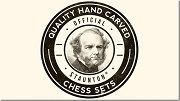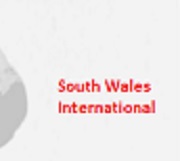1896-1960
Barry town was later than most South Wales towns in establishing a chess club. The reason for that was simple – on the 1881 census the collection of small villages where Barry now stands totalled a population of under 500. It was not until the docks were built in 1889 that the numbers exploded and by the 1891 census there were over 13,000 people living there. The chess club that eventually was created was wedged between older clubs at Penarth and Cardiff and the latter in particular sucked players from Barry into its membership. That was as true in the 1890s as it was in the 1960s.
In November 1893 a newspaper noted that E. A. H. Stewart of Cadoxton had played for Cardiff against Newport. In a column entitled ‘Aunt Maria’s Diary of the doings Round the Towns’ it stated that the first game with J. Thomas was drawn in two hours and that the second game (result not given) involved what was known as ‘the Barry Dock opening’!
In March 1896 the Barry Herald was decrying the lack of a club in the town and a letter from J. Felix Williams sought to rectify that. He commented that there were several players from the town playing for Cardiff. It says something of the class of chess player expected when he said that ‘there are many skilled players in the legal and medical professions and other chess-men in the neighbourhood.”
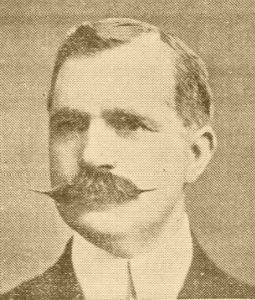
J. Felix Williams, a pioneer of Barry chess club.
CLUB FOUNDATION
A week (12th) later the same paper announced “a representative meeting of gentlemen interested in chess was held on Tuesday evening last, at the Shaftesbury Assembly Rooms, Cadoxton-Barry, when it was unanimously decided to establish The Barry District Chess Club”. Major Wyndham-Quin, M.P. was to be invited to be president and a list of eight vice-presidents was headed by General Lee, J.P.. E. A. H. Stewart was appointed captain with F. W. Hybart his deputy and J. Felix Williams acting as secretary and treasurer. The group agreed to meet every Tuesday at the Shaftesbury Hotel and settled on an annual subscription of five shillings.
General Lee was, for one year, President of the South Wales Chess Association, his tenure lying between those of Lord Aberdare and Lord Rhondda. He was a retired general and lived at Dinas Powis. He certainly played chess in Cardiff but there is no evidence that he ever played at or for the Barry club.
Edward A. H. Stewart (born in Sussex 1854) was employed by Barry Dock Railway Company as a storeman and his other pastime was that of stage manager for the Barry Histrionics Society. One wonders if that skill helped him at all in his role as captain of the new chess team.
The secretary, John Felix Williams, probably the most important post in any club, was managing clerk at the auditing department in Barry Dock and later became a town councillor. He was born in Llanybydder in 1864.
By the time the new season started in November the club had 57 members! This flood of membership on opening a new club was not unusual. Keeping the members was always (and still is) the problem. By the following March the club had moved to the Windsor Hotel.
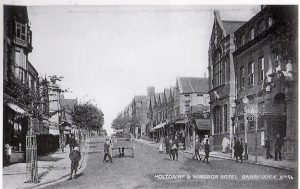
The Windsor Hotel is on the right of this picture dated 1910.
The new club continued to play friendly matches but did not join the South Wales Chess Association (SWCA) or compete in the South Wales Challenge Cup. The SWCA had its own problems and was more or less defunct between 1898 and 1904. Friendly matches were played over the next few years against Penarth, Bridgend and Cardiff and a team from St. Savior’s, Cardiff. The club proved particularly strong on the top three boards – F. W. Hybart, E. A. H. Stewart and J. Felix Williams, but fell away on lower boards.
Arguably the strongest player in South Wales at this time was Lewis J. Williams. He was the holder of the West of England Challenge Cup and one of the top players both in Cardiff and in Clifton. On 8th March 1899 he visited Barry and gave a 10-board simultaneous display. No doubt he had been invited by fellow Cardiff player, Frank Hybart but whether that had any bearing on the fact that Hybart lost a piece against him in the display and yet managed to win, might perhaps be stretching his generosity. J. Felix Williams won one of two games he played against the champion and A. E. Thomas drew.
The President by 1900 was Captain Hamilton Murrell, with Mr. Felix Williams acting as captain and Wilfred H. Murrell, the captain’s youngest son, as secretary. The captain lived in Penarth and had earned fame eleven years earlier when rescuing a stricken ship’s passengers and crew in the Atlantic.
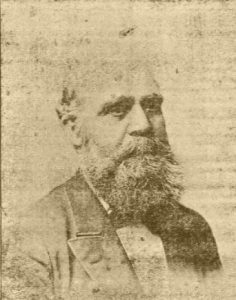
Captain Murrell J.P. (1835-1909)
In January 1900 the Barry Dock News reported a strange chess match between Barry Docks Conservative Club and Cardiff Dock Conservative Club, the former winning 9-8. However, the games seemed to have been played by consultation, results being reported thus: – “Gordon and Minnis (Barry) played Isaacs and Porter (Cardiff), 4 to 2”. Most strange.
The club was treated to a simultaneous display by the London master, Francis J. Lee on 28th February 1901. The master won 14, lost 2 to W. H. Murrell and F. Hybart and drew 1 with T. Dart. By this time the club was meeting every Friday at Barry Café.
The energetic new President of the South Wales Chess Association, A. H. N. Reddaway, visited the club at their new venue, the Grosvenor café, in November 1905. He was trying to breathe new life into the association and supported clubs that could become affiliated. Until now the Barry club had survived purely on friendly matches, adding an annual match against Barry Teachers to their program. Frank Hybart had been made Club President and no doubt his links with the Cardiff club would have eased Reddaway’s visit. In order to encourage the members he gave a simultaneous display and urged them to join SWCA, but Barry were quite comfortable as they were.
Lee returned in November 1906. Players were charged one shilling for the privilege of taking part in his display. He beat all but one of his 15 opponents and the Barry Herald opened with
“‘Sniped! Ye gods!’ There was something of despair, touched by amazement in the ejaculation. It had reference to the sudden disappearance of a pawn which had stealthily been advancing towards the promised land. The speaker gave no further evidence during the evening of his conversational powers.” Mr. F. Donovan achieved a creditable draw. When the vanquished were leaving the Grosvenor café one was heard to mutter, “I remember seeing a picture of the French troops returning from Moscow.”
Abercarn provided fresh opposition and at the end of the season the members, wishing play to continue in one form or another, played games by correspondence. This may have been the club’s incentive to arrange a correspondence match with Devonport, losing 4.5-5.5, with the rare appearance of a lady, a Miss Rees, on bottom board for Barry.
The first Saturday in October 1907 saw a new venture, a trip to Weston-super-mare. George Bastian had taken over as captain. The Barry team was well and truly trounced, only a draw by their captain saving their blushes. But the trip itself must have been a great success as there were two more matches between the clubs the following year with much closer scores.
AFFILIATION TO S. W. C. A.
The 1907-8 season was a momentous one for the Barry club. They took the decision for the first time to join the South Wales Chess Association and to compete in the Challenge Cup. The team was led by Frank Hybart who had a great deal of experience in this event, previously competing for Cardiff in the 1895 final.
In January they were victorious over Abercarn playing in Cardiff (the match was tied 3-3 but won on tie-break) and followed this up with a narrow 3.5-2.5 win away against Newport. In March they travelled to Newport where they met Tredegar, winning emphatically 4-2. Frank Hybart was more or less semi-retired from the game by this time but led the team for this momentous campaign. The final was played in May and although Hybart lost, the team were worthy winners of the Challenge Cup at the first attempt: 1. F. W. Hybart 0 H. Samuel 1; 2. G. L. Bastian .5 S. Daw .5; 3. J. M. Murgatroyd .5 3. S. H. Bevan .5; 4. W. G. Evans 1 G. Clarke 0; 5. F. W. Ffoulkes 1 D. R. Jones 0; 6. G. Randall 1 J. W. Lobbett 0. Barry 4 Llanelli 2.
The club tried to defend their title the following year, but other clubs were now aware of their strength and despite beating Abercarn and losing narrowly to Cardiff, they were heavily beaten by a full-strength Newport side which went on to win the Cup.
By October 1909 the club was meeting at the Working Men’s Institute. Albert Reddaway paid another visit and in a simultaneous display only won four of the eleven games, a clear indication of how much the club had improved.
THE EARLY CHESS STARS
Three players were regular top boards for the first Barry club; F. W. Hybart, J. M. Murgatroyd and G. L. Bastian.
Frank Hybart was undoubtedly the strongest of the three. He had played for a number of years for Cardiff chess club and represented South Wales in matches against Bristol & Clifton. Born in Bristol, he came to Cardiff as a child, his father working in the timber industry. Frank became manager and director of Robinson, David & Co., timber exporters. His brother, Arthur, and his son Claude, also played for the Barry team. By 1910 Frank Hybart had become president of the Barry club.
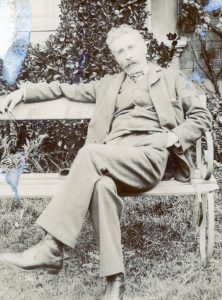
Frank Hybart 1856-1916
John M. Murgatroyd (1867-1933) was born in Halifax and worked on the railways
George L. Bastian (1875-1960) was born at Hayle in Cornwall. He initially worked in the docks as a clerk but then transferred to the Barry Docks Railway Company.
A CLUB REVIVED
With the SWCA not operating a competition, the Barry club reverted to the occasional friendly match after the 1908-9 season and may have become defunct even before the outbreak of war.
In October 1919 the club was re-formed with John Davies President, E. B. Thomas secretary and V. E. Holland treasurer meeting at Lane’s restaurant in Broad Street
This period is something of a ‘Dark Ages’ for chess records and any chess historian wishing to enlarge on the club story at this time would be advised to pore over the Barry Herald (1889-1962), the Barry Dock News (1889-1925), or the Barry chess club minute book at Glamorgan Record Office.
They certainly entered the Cup again in the 1921-2 season and are shown as beating Ogmore Vale, but other results went against them and they did not reach the final stages. The club was now led by Frank Hybart’s son, Claude, with Murgatroyd on Board 2. The most senior player was J. Felix Williams who still turned out on bottom board.
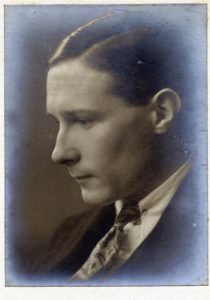
Claude Hybart aged about 24.
THE HARPERS ARRIVE!
The club soon disappeared again and although a Barry chess club minute book is deposited at Glamorgan Record Offices and dates 1926 to 1960, the first season of a new club was stated to be 1934-5. About seven years later F. G. H. Cooper and G. J. Clarke left the club and were noted as being, with D. Ll. Jones, founder members.
The SWCA had again become defunct about 1932 and did not restart until 1935, so the new Barry club was set up just in time to enter the latest variation of the Challenge Cup.
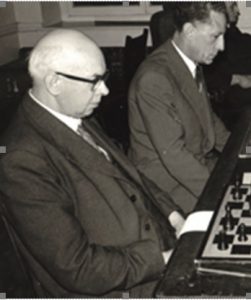
D. Ll. Jones of Barry and Cardiff
D.Ll.Jones died in 1968 whilst actually playing in the Reserves Tournament of the Welsh Championships. When he collapsed the ironic cry was heard, “Stop his clock!” Mr. Jones was a well- known character and everywhere he went he was accompanied by his huge white Tyrolean Mountain dog. When booking accommodation for a chess congress he first ensured that his dog would also be welcome! The auction of his many chess sets, books and other items at Cardiff Y.M.C.A. was a huge occasion that was very well attended.
The club still had the services of one of the Victorian era players, Frank Ffoulkes (1884-1951). He seems to have been something of an impresario. In 1911 his occupation is noted as ‘violinist’ and in 1939 as ‘professor of music’. One advertisement in the early part of the century shows him as ‘former leader of the Empire in Newport and various touring companies.” He was certainly involved in concerts and amateur dramatics in the town. They say that many chess players have a talent for maths or music. F. W. Ffoulkes certainly inclined to the latter. He had played in the final of the Challenge Cup in 1908 and in the following few years aspired to top board. He returned to the new club and, from 1939, led them as match captain for ten years. He played in several of the South Wales Individual Championships, being runner-up in 1939. The following year only he and fellow Barry member D. Ll. Jones entered and Ffoulkes won the title after playing just one game! He rarely played for South Wales but did turn out at least once on Board 3.
It was however, the arrival of three members of the Harper family that changed the fortunes of the club. Arthur Harper (1871-1961) was from Aston in Birmingham and had played chess there for the Bohemians chess club. When the family moved to South Wales in 1915 he and his two sons, A. M. (Monty) (1896-1969) and Stanley (1898-1982) played for the small Mountain Ash club in the late 1920s before moving to Barry about 1935.
In the 1926 South Wales Championship the Evening Express described the players thus:
“At the top of the first table sat Mr. A. Harper, a deeply absorbed player, who smoked a pipe incessantly.” And ” I felt sorry to see one so young as Mr. Harper enmeshed in the horrible toils of chess, so I looked as sympathetic as I could. But the look was wasted on the dark curls that adorned Mr. Harper’s head, as he was too absorbed in the wretched little chess men to look at me . . . .” Arthur Harper lost the play-off final on this occasion, but he won the title in 1925, 1929 and 1939. Monty Harper was runner-up on a couple of occasions.
Arthur Harper may have been the most successful in the family but it was the accountant, Monty, who was the real enthusiast. Whilst at Mountain Ash he was chess editor of the Glamorgan County Times and the Evening Express; he was a keen problemist with frequent posers in his column as well as in the Brixton Times; he was treasurer of SWCA 1951-1954 and of the Welsh Chess Union until 1965; and was arguably Wales’ leading postal chess player – of his known results over this period he scored 7.5 out of 13 for South Wales in the Counties Championships, all on very high boards. In 1950 A. M. Harper was runner-up in the Boyd Best Game Competition:
White: A.M.Harper Black: C.R.Gurnhill (Yorkshire)
1,e4 e5 2. Nf3 Nc6 3. Bb5 a6 4. Ba4 Nf6 5. 0-0 Be7 6. Re1 b5 7. Bb3 d6 8. c3 0-0 9. d4 Bg4 10. d5 Na5 11. Bc2 c5 12. Nbd2 Ne8 13. h3 Bh5 14. g4 Bg6 15. Nf1 h5 16. Ng3 hxg4 17. hxg4 Nf6 18. Nh4 Nh7 19. Nhf5 Bg5 20. Kg2 Bf4 21. Rh1 Rb8 22. b3 b4 23. c4 Nb7 24. Bxf4 exf4 25. Nh5 Bxh5 26. Rxh5 g6 27. Rxh7 gxf5 28. exf5 Qf6 29. Qh1 Rfe8 30. Qh5 f3+ 31. Kxf3 Nd8 32. g5 Resigns.
The presidency of the club changed every year with Mr. Ffoulkes being the first in 1935. Monty Harper took over from him as club secretary in 1950 and was also captain of the club from 1935 to 1960. Monty Harper also served as club treasurer before handing the duties to his brother in 1950. Club membership fee at this time was one shilling per quarter.
The Club Champions were:
1940 D. Ll. Jones
1943 Yeeles
1944 A. M. Harper
1946 A. M. Harper
1947 F. W. Ffoulkes
1948 S. M. Harper
1949 S. M. Harper
1950 S. M. Harper
1952 A. B. Harper
Nothing is known about the 1943 winner, Yeeles, but it is likely that he was serving in the area with the R. A. F. at St. Athans as the Barry club played a couple of friendly matches with the airmen. He may be Walter Yeeles who played for Chatham Institute Chess Club and was regular mid Kent individual champion. Monty and Stanley Harper both worked in the accounts with the Air Ministry at the start of the war, hence the connection. A. B. (Brian) Harper was the son of Stanley.
As in 1908, the club was immediately successful in the Challenge Cup competition. They tied with Aberamman, winning on tie-break before beating Cardiff 3.5-2.5 and winning the final, 4-2 against Port Talbot. The full result is not known but the team was led by F. W. Ffoulkes, A. M. Harper and S. M. Harper and the match was basically won over those top three boards.
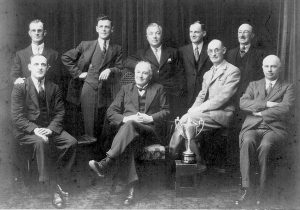
Barry Chess Club – Winners of the Challenge Cup 1935-6
Back: O.Ruckley, A.M.Harper, T.E.Minchington, J.Davies, G.J.Clarke
Front: S.M.Harper, F.W.Ffoulkes, A.Scoltock, D.Ll.Jones.
The following year they defended their title by beating Cwmamman 5-1 in the final. Unfortunately, the results of this match and of the final in 1938-9 when Barry beat Llanelli 3.5-2.5, are not known, but the Barry club was a small club and it is likely to have been basically the same team throughout this period.
Success again followed when activities resumed after the war and they beat Port Talbot 4-2 in the 1946 final. The Port Talbot team is not named but the successful Barry players were: 1. A. Harper .5; 2. F. W. Ffoulkes .5; 3. A. M. Harper 1; 4. S. M. Harper .5; D. Ll. Jones .5; 6. O. Ruckley 1.
Barry beat Port Talbot for the third time in a final in 1948, scoring 5-2.
They continued to compete regularly. The Cup was now fought out in two leagues – east and west, with the winners of each proceeding to the final. Port Talbot at last had their revenge in the 1954 final, winning on tie-break. Ironically it was a former Barry player, Claude Hybart, who made all the difference, beating Monty Harper on top board. All four top boards of the Barry team were filled by members of the Harper family with D.R.G. Bass and O. Ruckley on the lower boards.
The very small Barry club once again took the honours in 1955, beating Blackwood in the final; and the following year they scored their last success when they beat Aberystwyth. Again the teams are not known but in the semi-final Barry beat Swansea 4.5-1.5 with A. M. Harper, S. M. Harper, A. B. Harper, A. Harper (now 84. Was he the oldest player to ever play in the final?), D. R. G. Bass and D. Ll. Jones. .
The club continued to play in the new East Glamorgan League but finally folded in 1960, the three remaining members of the Harper family all joining Cardiff chess club. It would be many years before another chess club in the town emerged but when it did there would be a new generation of players, including young players, that would ensure a more enduring club than its predecessors.
Barry Chess Club 1960 0nwards
THE EGCA YEARS
The East Glamorgan Chess Association (egca) formed a league starting in 1954. At the time there was only one division and the Barry Chess Club took part. The inaugural champions, 1954-55 were Barry and they repeated that feat in the following season 1955/56. It would prove to be a long time before they would be champions again.
In 1960 the club folded. One of the members of the club at that time was Dave Adamson. It was not until 1971 that the Barry Chess Club reformed. There were seven members at that time and Dave Adamson was one of them. Dave was such a keen club member and held all of the available committee and team captain posts over the years. He continued to be a playing member of the club all the way to his death in 2015 completing 43 consecutive years as a member of the Barry Chess Club. This is a record that one suspects will never be broken.
In 1971 the league had grown to two divisions. In 1972 it grew to three divisions and in 1977 the league grew again to five divisions. As the chess club grew in membership more teams were entered into the league by the Barry Chess Club. At this time the club concentrated purely on league competition.
Success eventually came in the 1978/9 season when Barry Stauntons were crowned champions of Division 4. A feat they repeated in 1984/5.
Higher up the Divisions, the Barry Camelots won the Division 2 title in 1980/81. There were plenty of promotions and relegations with Divisions comprising ten teams with three being promoted and relegated from each division. Again, there was a long delay before another title came to Barry.
In the 1994/5 season for one season only there were five Divisions. Barry entered a new 4th team called the Barry Bosons and convincingly won this division. The following season the league returned to four Divisions so the Bosons victory moved them up to Division 3 which they promptly won.
The club was now on an upward trajectory because the Barry Camelots won the Third Division the following year and in 1997/98 the Bosons won the Second Division title. From then onwards they remained in the top Division until they were relegated in 2019/20 and promptly withdrew from the league altogether.
1997/98 was also the first year that the Barry Chess Club won the EGCA KO Cup. This competition started in the 1991/92 season.
The high point in the club’s league history came in the 2000/01 season. The Barry Bosons were Division 1 champions for only the third time and the first since 1955/56. The Barry Camelots won the Division 2 title and the Barry Stauntons won the Division 3 title. Barry also won the KO Cup for the second time playing as the Barry Barristers. The only black mark in the season came in Division 4. The Barry Gambits were leading the Division going in to the final round of games. They only needed a point to win the Division and complete a whitewash of trophies. The Caerphilly Knights were in second place but 4 points below the Gambits. In a bizarre decision the Caerphilly club were clearly unhappy about the possibility of Barry winning all the trophies and used five players from their Division 1 team none of whom had played in Division 4 all season. The Caerphilly players were far too strong for the Barry team and won the game 5 – 0. The Knights took the title by one point with the Gambits finishing as runners up but the means of attaining the title still rankles in the club.
In the following year Barry retained the KO Cup. They also won the Cup in 2008/9 and 2012/13. In the 22-year history of the Cup competition Barry had been successful five times.
Prior to the season starting in September 2003 the Barry Chess Club played at the Whitchill Hotel in Barry. A couple of different rooms upstairs were used meaning players representing different teams would not necessarily see or meet other members of the chess club playing in different teams. This all changed at the end of the 2002/03 season when the club moved to its current venue at the Barry West End Club. This offered the club the opportunity to use a much larger room meaning multiple league matches could be played at the same time and also giving an opportunity for players not selected for a team that night to meet, socialise and play some friendly matches.
In 2011/12 the relatively newly formed Barry Quarks took the Division 4 title and in 2012/13 the Barry Camelots captured the Division 2 trophy.
In season 2019/20, the Camelots finished 2nd in Division 2 with the Quarks finishing 2nd in Division 3. Both teams would be due to take their place in a higher division but due to the Coronavirus all chess stopped in March 2020 with no current indication of when further Over The Board chess can take place.
Covid 19 effectively stopped all chess from March 2020. The Welsh Assembly Government and the Welsh Sports Association would not allow indoor activities especially when players sit so close to one another for such a long time. However, as the pandemic became under control due to vaccinations it became possible for chess to return subject to each club completing a Risk Assessment. The Barry Chess Club was the first chess club in the East Glamorgan Chess zone to complete these requirements so chess was able to resume. Other clubs did not feel able to commit to a league tournament until January 2022 when a shortened season was planned.
League chess was finally able to return in January 2022. Member numbers were reduced so we decided to enter 3 teams. For the first time the size of league teams was reduced from 5 players to 4 players. There were only 2 divisions so we entered 1 team into division 1 with the remaining 2 teams in division 2. We were not really competitive in either division as with smaller team sizes other clubs were able to put out stronger teams in the second division. However, the players enjoyed the challenge of playing over the board even with some Covid restrictions applied to keep everyone safe.
In 2022 the EGCA League resumed properly. Teams remained at 4 players. However most clubs entered less teams than before the pandemic as it was unclear how many players would return so the league had only 3 divisions. In Barry we entered 3 teams again with our top team, Barry Quarks in division 2 and the remaining teams, Barry Gambits and Barry Bosons in division 3. Both divisions were very competitive.
In division 2 the Quarks started the season slowly and relegation was a possibility. However, as the season progressed the results improved and an excellent 3rd place was achieved.
In division 3 for most of the season both our teams were in the top 3. However a couple of poor results for the Gambits in their final 2 matches saw them tumble from 3rd place down to 8th place. The Bosons maintained their performance levels and finished 2nd, albeit by a narrow margin and some 4 points behind the divisional champions, Cardiff Eagles. 2nd place meant promotion for the Bosons who will play in division 2 next season.
THE WELSH CHESS UNION YEARS
The Welsh Chess Union (WCU) formed in 1970 as a separate governing body. When the Barry Chess Club reformed in 1971 they became members of the WCU.
Amongst the various competitions arranged by the WCU the Barry Chess Club regularly entered the Welsh KO Cup in both the Open Sections and U1500 section. The club never defaulted a board but had little success in the Open Section although they did win the Plate Trophy in 2013/14. Contrast this with the performance of the U1500 team who in 2009/10 were runners up, 2010/11 were Plate Trophy runners up, 2011/12 were again runners up, 2012/13 were Plate Trophy champions and in 2013/14 took home their first Welsh KO Cup Trophy. The following year they captured a second Welsh KO Cup Trophy. Unfortunately, the tournament has not been played since due to insufficient entries.
BARRY CLUB CHAMPIONSHIP
In 2010/11 at the instigation of Lee Davis the club decided to hold a Barry Club Championship. This would allow Barry Chess Club members to play competitively rated chess matches against other members of the club.
The initial competition was designed as a Knock Out Cup but it proved difficult to arrange games as there were league matches being played most weeks. After a couple of years, the championship changed to a Swiss system and dates for each round of matches were arranged on a monthly basis.
With the relaxing of covid restrictions at the end of 2021 we were able to organize our club championships prior to the commencement of league chess. In his first championship took the title of club champion picking up 4.5 points from 5 rounds. The key match was in round 4 when Gwyn defeated the eventual runner up, Ian Abraham. Ian finished on 4 points. In the Plate it was just as close. Phil Jones took 3 points and the reigning champion, Erion Pici had to be satisfied with second place just a half point behind.
The individual champions and runners up in all 3 sections of the Club Championships are listed below: –
| Club Championships |
|||
| Open | Winner | Runner Up | |
| 2010/11 | Richard Hanscombe | Nigel Ralphs | |
| 2011/12 | Lee Davis | Ashley Davis | |
| 2012/13 | Lee Davis | Rhys Steele | |
| 2013/14 | Lee Davis | Craig Woolcock | |
| 2014/15 | Ashley Davis | Matthew Parry | |
| 2015/16 | Ashley Davis | Matthew Davies | |
| 2016/17 | Sam Jukes | Ken Hannah | |
| 2017/18 | Dave Parsons | Mark Cooke2 | |
| 2018/19 | Tom Cooke | Dave Parsons | |
| 2021/22 | Gwyn Havard | Ian Abraham | |
| Plate | Winner | Runner Up | |
| 2010/11 | Phil Jones | Sam Jukes | |
| 2011/122 | Sam White | Sam Jukes | |
| 2012/13 | Kevin Gandy | Sam White | |
| 2013/14 | Ken Hannah | Sam White | |
| 2014/15 | Windsor Lewis | Ken Hannah | |
| 2015/16 | Martin Ricketts | Ken Curry | |
| 2016/17 | Summer Cooke | Dave Mahoney | |
| 2017/18 | Scott Turner | Peter Watkins | |
| 2018/19 | Erion Pici | Ken Curry | |
| 2021/22 | Phil Jones | Erion Pici | |
| Bowl | Winner | Runner Up | |
| 2013/14 | John Stephenson | Phil Jones | |
| 2014/15 | Stephen Bonutto | Pagona Mavroyenneas | |
| 2015/16 | Ray Denyer | David Jones | |

Lee Davis
PLAYERS
The Barry Chess Club currently has 28 members making it the 3rd largest club in the EGCA. Of those players Steve Cunliffe, Phil Jones, Dave Mahoney, Dave Parsons, Martin Ricketts, Peter Watkins and Sam White have all been members for at least 20 consecutive seasons. Players come and players go but the club gained numerous members from articles published on a weekly basis in the now defunct Barry Gem.
There have been highs and lows but a number of individual champions which include: –
| 1997 | Tom Weston Memorial | Andrew Gandy |
| 2000 | Welsh Champion | Leighton Williams* |
| 2003 | Tom Weston Memorial | Craig Woolcock |
| 2007 | Welsh Senior Champion | Lee Davis |
| 2009 | Tom Weston Memorial | Richard Hanscombe |
| 2010 | John Bishop Memorial | Sam White** |
| 2011 | John Bishop Memorial | Sam White |
*He won the title on numerous occasions but only once as a Barry Chess Club member
** Trophy shared by 3 players
Lee Davis, Sam Jukes and Nigel Ralphs were regular players in congresses and championships across Wales/West Midlands/South West and achieved various successes.
Special mention should be made of the late Alan St Clair. He was a strong player who liked to play the London System. His successes with this opening led to a number of club players adopting this opening. However, it is not just his success in playing but also his love of alcohol that makes him so special. He was once spotted at the bar of an AGM ordering 8 pints. He placed all 8 drinks in front of him and proceeded to drink them all before the AGM was only half completed. Once during a match, he was said to have fallen into a drunken stupor. With his clock quickly running down he awoke and preceded to play quickly and force a victory.
AND FINALLY
Barry chess club has entered the new National On-Line League which the WCU is running during the coronavirus crisis over 2020/21. It was not easy to persuade people to play in this tournament as most of our players want to play face to face chess only but we did manage to get 6 players to form a squad to play in the U1800 section. However, as games were played on a set day every couple of weeks one of our players had to withdraw as he was not available on Wednesdays. Had we been able to field our strongest team we would have been competitive but this never actually happened. In the end we finished in 11th place out of 13 teams. When we won games it was by a narrow margin, but when we lost we were overpowered so tie-breaks worked against us. An extra draw would have moved us the table considerably.
After the success of this tournament another one was organized in the early part of 2021. Again the Barry Chess Club entered Tournament 2 with a 6 man squad. We performed slightly better and finished 10th out of 14 teams. Similarly to the previous tournament we could never field our strongest 4 players so could not match our seeding of 7th. However, tie-breaks worked against us as 3 other teams finished on the same number of points but all managed a better tie-break.
The players involved all seemed to enjoy the experience but when Tournament 3 commenced the Barry Chess Club failed to raise a team and did not enter. Perhaps this signals the end of On-Line chess for the club.
(The most recent part of this narrative i.e. after 1960, has been written by Phillip Jones, current secretary of the starting in 2020 Barry Chess Club.)




